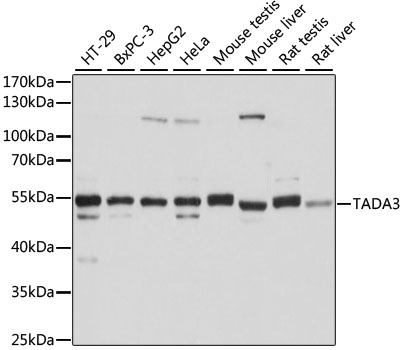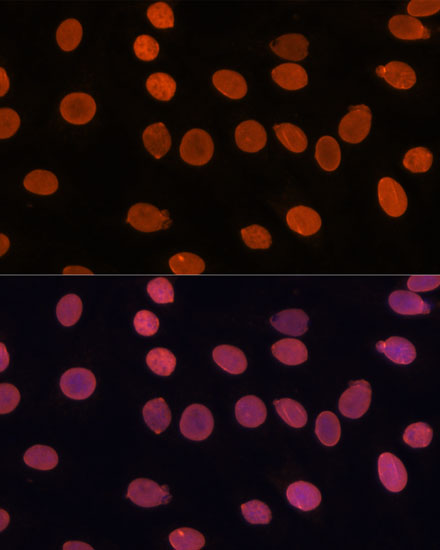Epigenetics & Nuclear Signaling Antibodies 2
Anti-TADA3 Antibody (CAB6224)
- SKU:
- CAB6224
- Product Type:
- Antibody
- Reactivity:
- Human
- Reactivity:
- Mouse
- Reactivity:
- Rat
- Host Species:
- Rabbit
- Isotype:
- IgG
- Antibody Type:
- Polyclonal Antibody
- Research Area:
- Epigenetics and Nuclear Signaling
Description
| Antibody Name: | Anti-TADA3 Antibody |
| Antibody SKU: | CAB6224 |
| Antibody Size: | 20uL, 50uL, 100uL |
| Application: | WB IF |
| Reactivity: | Human, Mouse, Rat |
| Host Species: | Rabbit |
| Immunogen: | Recombinant fusion protein containing a sequence corresponding to amino acids 270-369 of human TADA3 (NP_597814.1). |
| Application: | WB IF |
| Recommended Dilution: | WB 1:500 - 1:2000 IF 1:50 - 1:200 |
| Reactivity: | Human, Mouse, Rat |
| Positive Samples: | HT-29, BxPC-3, HepG2, HeLa, Mouse testis, Mouse liver, Rat testis, Rat liver |
| Immunogen: | Recombinant fusion protein containing a sequence corresponding to amino acids 270-369 of human TADA3 (NP_597814.1). |
| Purification Method: | Affinity purification |
| Storage Buffer: | Store at -20'C. Avoid freeze / thaw cycles. Buffer: PBS with 0.02% sodium azide, 50% glycerol, pH7.3. |
| Isotype: | IgG |
| Sequence: | EENI ISPM EDSP IPDM SGKE SGAD GAST SPRN QNKP FSVP HTKS LESR IKEE LIAQ GLLE SEDR PAED SEDE VLAE LRKR QAEL KALS AHNR TKKH DLLR |
| Gene ID: | 10474 |
| Uniprot: | O75528 |
| Cellular Location: | Nucleus |
| Calculated MW: | 41kDa/48kDa |
| Observed MW: | 55kDa |
| Synonyms: | TADA3, ADA3, NGG1, STAF54, TADA3L, hADA3 |
| Background: | DNA-binding transcriptional activator proteins increase the rate of transcription by interacting with the transcriptional machinery bound to the basal promoter in conjunction with adaptor proteins, possibly by acetylation and destabilization of nucleosomes. The protein encoded by this gene is a transcriptional activator adaptor and a component of the histone acetyl transferase (HAT) coactivator complex which plays a crucial role in chromatin modulation and cell cycle progression. Along with the other components of the complex, this protein links transcriptional activators bound to specific promoters, to histone acetylation and the transcriptional machinery. The protein is also involved in the stabilization and activation of the p53 tumor suppressor protein that plays a role in the cellular response to DNA damage. Alternate splicing results in multiple transcript variants of this gene. |
| UniProt Protein Function: | TADA3L: Functions as a component of the PCAF complex. The PCAF complex is capable of efficiently acetylating histones in a nucleosomal context. The PCAF complex could be considered as the human version of the yeast SAGA complex. Also known as a coactivator for p53/TP53-dependent transcriptional activation. Component of the ATAC complex, a complex with histone acetyltransferase activity on histones H3 and H4. Belongs to the NGG1 family. 2 isoforms of the human protein are produced by alternative splicing. |
| UniProt Protein Details: | Protein type:Nuclear receptor co-regulator; Transcription factor Chromosomal Location of Human Ortholog: 3p25.3 Cellular Component: nucleoplasm; intracellular; nucleus Molecular Function:ligand-dependent nuclear receptor binding; protein domain specific binding; protein binding; histone acetyltransferase activity; ligand-dependent nuclear receptor transcription coactivator activity; transcription coactivator activity; transcription factor activity Biological Process: regulation of transcription from RNA polymerase II promoter; mitosis; regulation of histone deacetylation; regulation of protein amino acid phosphorylation; establishment and/or maintenance of chromatin architecture; estrogen receptor signaling pathway; transcription, DNA-dependent; positive regulation of transcription, DNA-dependent; regulation of protein stability |
| NCBI Summary: | DNA-binding transcriptional activator proteins increase the rate of transcription by interacting with the transcriptional machinery bound to the basal promoter in conjunction with adaptor proteins, possibly by acetylation and destabilization of nucleosomes. The protein encoded by this gene is a transcriptional activator adaptor and a component of the histone acetyl transferase (HAT) coactivator complex which plays a crucial role in chromatin modulation and cell cycle progression. Along with the other components of the complex, this protein links transcriptional activators bound to specific promoters, to histone acetylation and the transcriptional machinery. The protein is also involved in the stabilization and activation of the p53 tumor suppressor protein that plays a role in the cellular response to DNA damage. Alternate splicing results in multiple transcript variants of this gene. [provided by RefSeq, May 2013] |
| UniProt Code: | O75528 |
| NCBI GenInfo Identifier: | 46397743 |
| NCBI Gene ID: | 10474 |
| NCBI Accession: | O75528.1 |
| UniProt Secondary Accession: | O75528,Q6FI83, Q9UFS2, |
| UniProt Related Accession: | O75528 |
| Molecular Weight: | 432 |
| NCBI Full Name: | Transcriptional adapter 3 |
| NCBI Synonym Full Names: | transcriptional adaptor 3 |
| NCBI Official Symbol: | TADA3 |
| NCBI Official Synonym Symbols: | ADA3; NGG1; hADA3; STAF54; TADA3L |
| NCBI Protein Information: | transcriptional adapter 3; ADA3 homolog; ADA3-like protein |
| UniProt Protein Name: | Transcriptional adapter 3 |
| UniProt Synonym Protein Names: | ADA3 homolog; hADA3; STAF54; Transcriptional adapter 3-like; ADA3-like protein |
| Protein Family: | Transcriptional adapter |
| UniProt Gene Name: | TADA3 |
| UniProt Entry Name: | TADA3_HUMAN |








